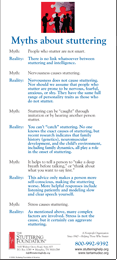 Download a PDF of these myths.
Download a PDF of these myths.
Myth: People who stutter are not smart.
Reality: There is no link whatsoever between stuttering and intelligence.
Myth: Nervousness causes stuttering.
Reality: Nervousness does not cause stuttering. Nor should we assume that people who stutter are prone to be nervous, fearful, anxious, or shy. They have the same full range of personality traits as those who do not stutter.
Myth: Stuttering can be “caught” through imitation or by hearing another person stutter.
Reality: You can’t “catch” stuttering. No one knows the exact causes of stuttering, but recent research indicates that family history (genetics), neuromuscular development, and the child’s environment, including family dynamics, all play a role in the onset of stuttering.
Myth: It helps to tell a person to “take a deep breath before talking,” or “think about what you want to say first.”
Reality: This advice only makes a person more self-conscious, making the stuttering worse. More helpful responses include listening patiently and modeling slow and clear speech yourself.
Myth: Stress causes stuttering.
Reality: As mentioned above, many complex factors are involved. Stress is not the cause, but it certainly can aggravate stuttering.






 Podcast
Podcast Sign Up
Sign Up Virtual Learning
Virtual Learning Online CEUs
Online CEUs Streaming Video Library
Streaming Video Library